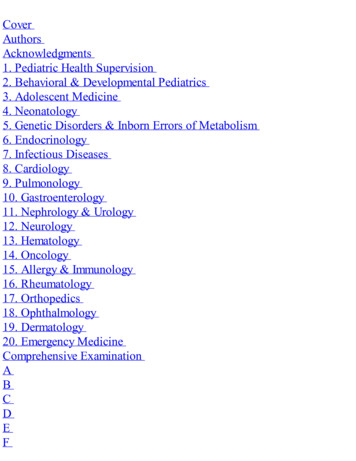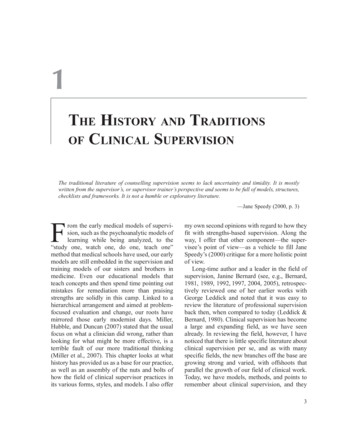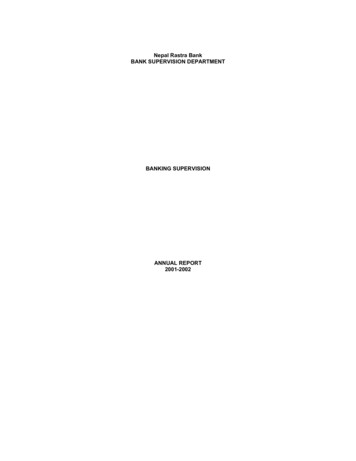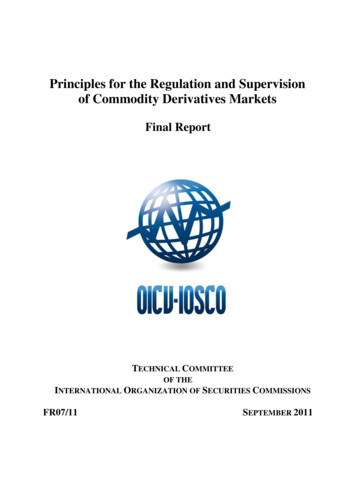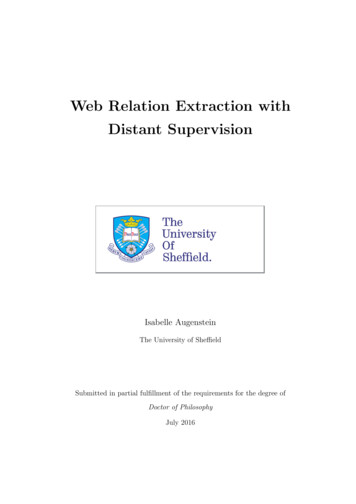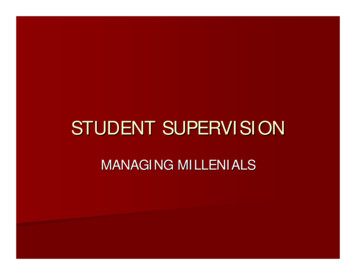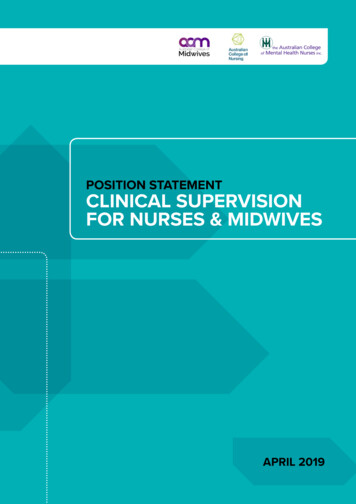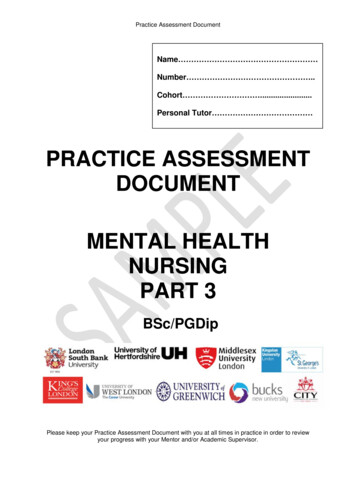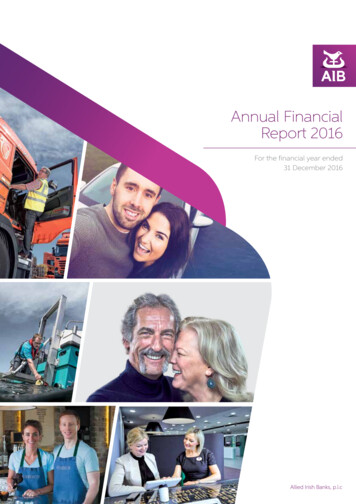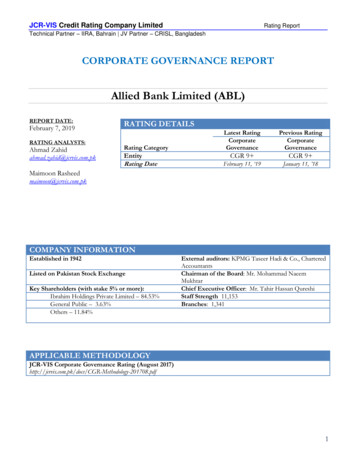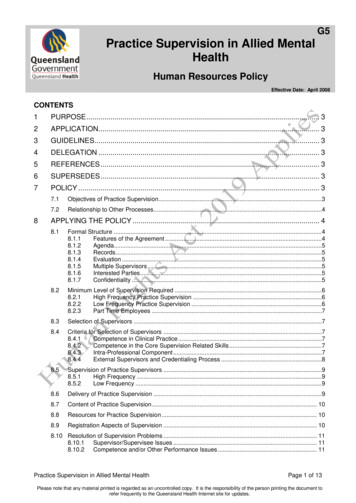
Transcription
G5Practice Supervision in Allied MentalHealthHuman Resources PolicyEffective Date: April 2008CONTENTS1PURPOSE . 32APPLICATION. 33GUIDELINES. 34DELEGATION . 35REFERENCES . 36SUPERSEDES . 37POLICY . 387.1Objectives of Practice Supervision.37.2Relationship to Other Processes.4APPLYING THE POLICY . 48.1Formal Structure .48.1.1Features of the Agreement .48.1.2Agenda.58.1.3Records.58.1.4Evaluation .58.1.5Multiple Supervisors .58.1.6Interested Parties .58.1.7Confidentiality .58.2Minimum Level of Supervision Required .68.2.1High Frequency Practice Supervision .68.2.2Low Frequency Practice Supervision .68.2.3Part Time Employees .78.3Selection of Supervisors .78.4Criteria for Selection of Supervisors .78.4.1Competence in Clinical Practice .78.4.2Competence in the Core Supervision Related Skills .78.4.3Intra-Professional Component .78.4.4External Supervisors and Credentialing Process .88.5Supervision of Practice Supervisors .98.5.1High Frequency .98.5.2Low Frequency .98.6Delivery of Practice Supervision .98.7Content of Practice Supervision . 108.8Resources for Practice Supervision . 108.9Registration Aspects of Supervision . 108.10 Resolution of Supervision Problems . 118.10.1 Supervisor/Supervisee Issues . 118.10.2 Competence and/or Other Performance Issues . 11Practice Supervision in Allied Mental HealthPage 1 of 13Please note that any material printed is regarded as an uncontrolled copy. It is the responsibility of the person printing the document torefer frequently to the Queensland Health Internet site for updates.
HR Policy G5April 20089DEFINITIONS. 1110HISTORY . 13ATTACHMENT ONE:Sample Agreement for Practice SupervisionATTACHMENT TWO:Setting Agendas SampleATTACHMENT THREE:Sample Record of Supervision MeetingsATTACHMENT FOUR:Roles and ResponsibilitiesATTACHMENT FIVE:Sample Confidentiality Agreement for Engagement of External SupervisorsATTACHMENT SIX:Flow chart for Implementing Practice Supervision in MentalHealth ServicesPractice Supervision in Allied Mental HealthPage 2 of 13Please note that any material printed is regarded as an uncontrolled copy. It is the responsibility of the person printing the document torefer frequently to the Queensland Health Internet site for updates.
HR Policy G5April 20081PURPOSETo outline the principles and processes of practice supervision for HealthProfessionals in the Mental Health Services.2APPLICATIONThis policy applies to all allied health employees in Mental Health Services.This policy may be applied at the discretion of the District Manager or delegate to: medical employees non-acute and/or non-inpatient based nursing employee (i.e. community-basedMental Health Nurses).3GUIDELINESGuidelines may be developed to facilitate implementation of this policy. Theguidelines must be consistent with this policy.4DELEGATIONThe “delegate” is as listed in the Queensland Health Human Resource DelegationsManual as amended from time to time.5REFERENCES 6SUPERSEDES 7Grievance HR policyPerformance Appraisal and Development HR policyPerformance Improvement HR policyProfessional Registration – Medical Practitioners, Nurses and Other HealthProfessionals HR policyIRM 3.14-1 Practice Supervision for Health Professionals in the Mental HealthServicesPOLICYQueensland Health supports the provision of clinical supervision through currentpolicies and strategies including the Ministerial Taskforce on Clinical Education andTraining, 2007, the Queensland Mental Health Strategic Plan: 2003-2008 and theFramework for the Development of the Future Mental Health Workforce inQueensland, 2000. Further initiatives are currently progressing statewide policy onclinical supervision for the mental health workforce.7.1Objectives of Practice SupervisionThe primary aims of practice supervision are to: Maintain the highest possible standards of mental health practice, mental healthservice and consumer outcomes through a formal process of practicesupervision.Practice Supervision in Allied Mental HealthPage 3 of 13Please note that any material printed is regarded as an uncontrolled copy. It is the responsibility of the person printing the document torefer frequently to the Queensland Health Internet site for updates.
HR Policy G5April 2008 Maximise employee morale and retention.These aims of practice supervision are to be achieved by: Engaging allied health managers and employees in a formal process of practicesupervision. Recognising and promoting good practice. Fostering development of relevant skills and knowledge. Assisting employees to solve problems in fulfilling their duties.7.2Relationship to Other ProcessesPractice supervision arrangements are part of: The employee development process (although not the sole focus of employeedevelopment). Performance appraisal and development plans.8APPLYING THE POLICYPractice supervision is an important part of the development of an Allied HealthProfessional employee. The following features of the program provide a structurewithin which practice supervision is to be conducted in district health services. Thefeatures allow significant opportunity to negotiate details at the local level.8.1Formal StructureFormal practice supervision relationships are to be formalised by a written agreement(refer Attachment One).Practice supervision will typically occur in work time. The frequency, duration ofpractice supervision sessions and the general nature of supervision outcomes are tobe reported to the supervisee’s manager at least every 12 months.8.1.1Features of the AgreementThe agreement is to specify: the goals of practice supervision expected outcomes the mutual obligations structure of supervision evaluation processes limits of confidentiality ethical issues content of supervision.Supervision agreements are not formal contracts between the parties. Thesupervision agreements are to be statements of mutual understanding about thenature of practice supervision that each party will attempt to provide or obtain.Agreements are subject to unforeseen circumstances (eg changes in workload, dutiesor workplace location) and regular review and renegotiation. The review andrenegotiation is recommended to occur at least annually. The written agreement maybe negotiated by the parties at any time.Practice Supervision in Allied Mental HealthPage 4 of 13Please note that any material printed is regarded as an uncontrolled copy. It is the responsibility of the person printing the document torefer frequently to the Queensland Health Internet site for updates.
HR Policy G5April 20088.1.2AgendaIt is recommended that there is a written agenda for each practice supervisionsession. A Sample Setting Agendas form is provided in Attachment Two.8.1.3RecordsParticipants in practice supervision relationships are encouraged to maintain recordsof practice supervision sessions for their own benefit. These types of records shouldnot be onerous.A Sample Record of Supervision Meetings is provided in Attachment Three.8.1.4EvaluationEvaluation of practice supervision and goal attainment is to be undertaken by bothparties at least every 12 months.8.1.5Multiple SupervisorsA supervisee may have more than one practice supervisor at any given time tomaximise access to specific practice/clinical expertise and/or competencies across thefull spectrum of mental health service provision. Employees should consider having aprimary supervisor and negotiate the use of additional practice supervisors on an ‘asneeds’ basis.The goals of the sessions provided by any additional practice supervisors could beadded to the existing written agreement between the supervisee and primarysupervisor. One agreement minimises inefficiencies with administrative workloadsassociated with the use of multiple written agreements. Additionally, one agreementfacilitates an integrated and coordinated approach to a supervisee’s practice needs.8.1.6Interested PartiesA supervision agreement is to outline the role of interested parties, and the limits ofconfidentiality and/or information sharing to occur. Where managers and clinicaldirectors are involved in practice supervision, issues associated with duality in rolesare to be identified and clearly articulated in supervision agreements (ie howmanagement of the dual roles will occur). Refer to Attachment 4 for typical roles andresponsibilities of practice supervisors and managers/clinical directors.The sample supervision agreement includes an area where the management of roleduality and associated issues can be agreed.8.1.7ConfidentialityExchanges of information between supervisees and managers about theirprofessional development and performance should be as free as possible to build aneffective practice supervision relationship. Exchange of information is to be balancedagainst the need for confidentiality. Practice supervision agreements are to stipulateareas of confidentiality and the limits to confidentiality.Practice Supervision in Allied Mental HealthPage 5 of 13Please note that any material printed is regarded as an uncontrolled copy. It is the responsibility of the person printing the document torefer frequently to the Queensland Health Internet site for updates.
HR Policy G5April 2008The agreements may specify: What is to occur if impaired or inappropriate practice is alleged or identified. Discussion of the practice supervision with the supervisor’s own supervisorand/or the manager of the supervisee. If and how information within a practice supervision relationship may impact onfuture recruitment and selection exercises.Issues about confidentiality and documentation of supervision are to be included insupervision agreements.Where practice supervision is delivered by the person who also undertakes theperformance and development process and/or administrative supervision/linemanagement, a clear agreement on confidentiality is especially important.8.2Minimum Level of Supervision RequiredMinimum levels for formal practice supervision are to be provided and reviewedaccording to needs, resources and staffing profiles. The minimum level does notinclude peer consultation or other methods of informal supervision or consultation.The minimum level should not be interpreted as a maximum or routine level. Greateramounts of practice supervision may be required to meet the objectives ofprofessional development and the maintenance of high quality services eg where thesupervisee is a sole rural practitioner. Supervision contact above the minimum levelsis subject to the availability of resources.Practice supervision frequency will vary according to the level of relevantcompetencies and experience. A minimum level of monthly access to practicesupervision for full time employees is recommended as follows.8.2.1High Frequency Practice SupervisionHigh frequency practice supervision is to occur at least four (4) hours per month withparticipants meeting at least weekly. The supervisee will participate in at least two (2)hours per month each of supervision from the same profession and individualsupervision.High frequency practice supervision is applicable for the following employees: Recent graduates - employees in the first two (2) years (full-time equivalent) ofmental health practice since graduation of entry level qualification. Employees with limited practice experience in mental health. Employee having significant change in role eg from CYMHS to Adult MHS orfrom acute to community based work.8.2.2Low Frequency Practice SupervisionLow frequency practice supervision is to be provided for employees with more thanfive (5) years’ experience (full time equivalent) in mental health practice and whodemonstrate advanced skills in all areas relevant to their current duties (includingpractice supervision). The supervisee will participate in at least one (1) hour permonth of supervision with the equivalent of one (1) hour each three (3) months ofsupervision from the same profession. The supervision may be from a peer.Practice Supervision in Allied Mental HealthPage 6 of 13Please note that any material printed is regarded as an uncontrolled copy. It is the responsibility of the person printing the document torefer frequently to the Queensland Health Internet site for updates.
HR Policy G5April 20088.2.3Part Time EmployeesThe amount of practice supervision for part time employees should be at leastproportionate to the full time equivalent and should occur at least monthly.8.3Selection of SupervisorsWhenever possible, practice supervision is to be obtained from within the local MentalHealth Service. When this is not possible or practical, practice supervision should besought from within another health service district. When there are insufficientsupervisors to meet the demand for supervision, supervision may need to be obtainedthrough engagement of an external supervision provider. Supervisors are to meetminimum levels of relevant experience (refer to section 8.4).8.4Criteria for Selection of Supervisors8.4.1Competence in Clinical PracticePractice supervision contact will be obtained from a supervisor with: At least two (2) years of FTE mental health practice experience (with apreference of five (5) or more years of experience). Demonstrated advanced skills in core competencies in mental health or thedevelopment of expert/advanced competencies. The practice supervisor’scompetencies are to be relevant to the supervisee's current practice supervisionneeds.The supervisor will have at least the same or higher level of practice skills than thesupervisee, in the majority of specific competencies that are the primary focus of thesupervision. Whenever possible, at least 50 per cent of the minimum contact levelswill be obtained from a supervisor with at least five (5) years of experience in mentalhealth practice and advanced relevant practice skills.Supervision contact will usually be face-to-face, although supervision via electronicmeans is encouraged when face-to-face contact is not possible.8.4.2Competence in the Core Supervision Related SkillsAll practice supervisors are expected to be able to demonstrate that they haveappropriate competence levels in skill areas required for effective practice supervision.The Queensland Health Mental Health Service recognises an obligation to provideaccess to appropriate training and evaluation of competence in supervision skills.8.4.3Intra-Professional ComponentAppropriate targeted practice supervision is recommended to develop team members’skills to contribute to multidisciplinary case review.Practice supervision by members of other professions is recommended when: Employees need to develop core competencies. The practice supervisor has expertise in a specific skill area that is needed in thespecific work setting, consumer group or procedure.Practice Supervision in Allied Mental HealthPage 7 of 13Please note that any material printed is regarded as an uncontrolled copy. It is the responsibility of the person printing the document torefer frequently to the Queensland Health Internet site for updates.
HR Policy G5April 2008The primary criterion for selection of supervisors or consultants from outside theprofession is the level of relevant knowledge and skills rather than their profession.Some supervision from members of the same profession is advised for all healthemployees. It is recommended that at least 50 per cent of practice supervision contactis obtained from an appropriate supervisor from the same profession. The amountand proportion of practice supervision that is obtained depends on: service requirements the employee’s role negotiations between the employee member, managers and supervisors routine discussions of practice supervision as part of the performance anddevelopment plan process.When there are legislation or professional accreditation requirements related toregulating supervision within that profession, those requirements should be givenpriority and aligned to employment related practice duties wherever possible.8.4.4External Supervisors and Credentialing P
Practice Supervision in Allied Mental Health Page 1 of 13 Please note that any material printed is regarded as an uncontrolled copy. It is the responsibility of the person printing the document to refer frequently to the Queensland Health Internet site for updates. G5 Practice Supervision in All
